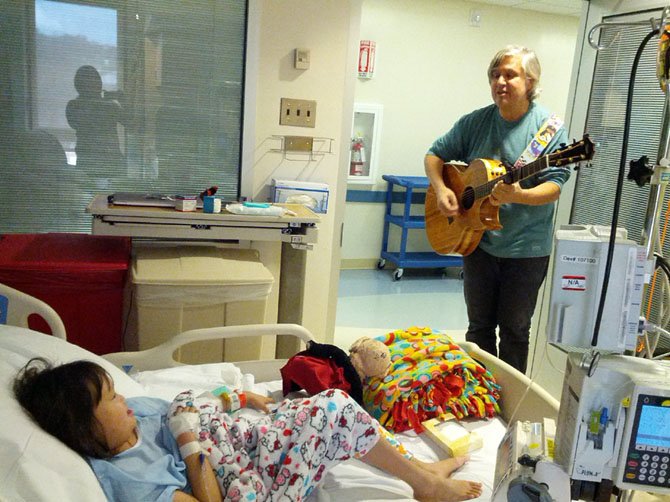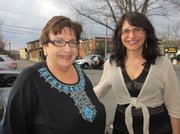Pickleberry Pie supporter, musician Fred Karam, plays bedside for a sick child at Georgetown University Hospital
Locations for Pickleberry Pie-sponsored shows in D.C. region
Northern Virginia to Charlottesville: Inova Keller School, Inova Keller Partial-hospitalization Program (hiatus), The Kilmer Center—Vienna, and University of Virginia Children’s Hospital [beginning mid-2013]; Washington, D.C.: Georgetown University Hospital—Pediatrics Department, Lombardi Pediatric Cancer Center and the Lab School of Washington; Baltimore: University of Maryland Children's Hospital, Mt. Washington Pediatric Hospital, Johns Hopkins Children's Center [currently under redevelopment], Samuelson Children's Hospital at Sinai, Kennedy Krieger Institute and Baltimore Lab School; Miami, Fla.: Miami Children's Hospital, the Michael Fux Family Center, Camp FunRise for children with rheumatology issues and Lion's Camp for children with diabetes.
See www.pickleberrypie.… for services and resources.
If you’ve never witnessed the therapeutic power of music, you’ve never seen a Pickleberry Pie-sponsored live performance for hospitalized children or disabled students. Prominent professional performers—from musicians and storytellers to animals—bring their specialties to school or hospital centers or to the hospital rooms of children too sick to leave their beds. Pickleberry Pie, a national service organization with a large network in the D.C. area, funds the performances. Most participating performers hire out at reduced rates as a public service.
In 2013, Pickleberry Pie, Washington region, “adopted” the Kilmer Center in Vienna, bringing to the school for severely disabled children, aged 5 to 22, the dynamics of live music and culture. Miraculously, Pickleberry Pie performances have inspired breakthroughs in the lives of the disabled children.
“People underrate the power of live performance,” said East Coast Liaison for Pickleberry Pie Irene Light, of Vienna. Light teaches piano in Vienna, as well. “When we’ve sent performers to schools or hospitals, we’ve made breakthroughs or brought happiness to sick kids.”
Light emphasized that all Pickleberry Pie performers are professionals who entertain for a living. Some, she said, are attracted to school shows while others prefer hospital visits. Performers who visit hospitals, whether they are for a crowd or at a bedside, must follow the hospital’s rules for participation. Once they get the happy smiles and engagement of the sick children, the performers want to return soon, Light said. Light’s job is to pair the performer with an appropriate venue.
Light said that if a hospital or special needs school wants a program with a special theme, Pickleberry Pie performers meet the challenge and do whatever is requested even though they have to go through the work of creating a one-time program. Perhaps, she said, the responding performer composes new songs or creates new stories. “That is true professionalism and devotion to the cause,” said Light.
A Kilmer Center teen, abnormally sensitive to sound and stimulation, did something during a concert presentation he had never done before. He removed his ever-worn earphones, the ones that buffered sounds. He wanted to hear the music.
LIGHT REMEMBERS the child about to undergo chemotherapy who asked Pickleberry Pie go-to artist Fred Karam to be there for her chemo treatment because it would make her feel better. “Fred was right there for her and they had a blast,” said Light. Karam, who lives in Virginia Beach, is a Pickleberry Pie regular who frequently donates his performances. He is putting on a show at the Kilmer Center on April 8 and is buying a sound system for the school.
“The performers themselves are so generous,” said Light. “About a third of them donate additional shows at no cost to us.”
Kilmer Center is a Fairfax County public school serving students, aged 5 to 22, with severe disabilities. The school maintains two programs. One is for students with severe intellectual disabilities paired with a medical fragile status. These students are non-verbal and non-ambulatory, with serious medical co-conditions such as seizure disorders, respiratory issues, gastrointestinal issues, and a myriad of congenital and birth trauma injuries. Students in that program are wheelchair-bound with little control over limb movement. They typically are tube-fed, and several of them are dependent on portable ventilators for breathing and attend Kilmer Center with a personal nurse.
The other program is for students with varying degrees of intellectual disability paired with severe autism and behavioral/conduct disorders. These severe behaviors require very low staff-student ratios.
“Our school is the last and best hope for keeping our community’s most challenging and vulnerable learners in the public education system,” said Stacy Kafka, expressive arts teacher at Kilmer Center. “We serve as the center of influence for connecting our students and families with all available services. This holistic approach embraces each family with warmth and hope for the very best outcome for each of our learners.”
Kafka called Kilmer Center’s students “amazing kids” who have disabilities. Peers from Kilmer Middle School in the building next door and students from Madeira girls’ school come in to volunteer peer-to-peer. Kilmer Center students go out into the community for vocational training or to develop social skills. “It’s a privilege for the community to get to know these kids,” said Kafka.
Pickleberry Pie hires the performers who come to entertain the students and staff at the Kilmer Center. The shows are presented, at the minimum, monthly but some of the performers are such avid fans of the school and its students that they donate extra performances beyond the grant money awarded for that purpose, Light said. Each production costs Pickleberry Pie approximately $500, less than what the performers—many of whom are award-winning nationally—usually charge.
The grant for Pickleberry Pie programming at the Kilmer Center, which was funded in December of 2012, comes from the Harry and Zoe Poole Foundation.
FOR PICKLEBERRY PIE to offer the vast array of performance services that it does, Light spends a large percentage of her day seeking funding for the metro-area programming. She needs, at least, $40,000 to $50,000 a year to cover the performances at the region’s dozen locations.
Kilmer Center, too, has needs without the funding to cover all of them. “We have a lot of needs and an intense need of fundraising,” said Kafka. “Our biggest need right now is renovation of our sensory room, and our technology needs are vast.
“Pickleberry Pie has brought us the best gift of all, the gift of live music.”
To learn more about Pickleberry Pie, go to www.pickleberrypie.org. To support the Kilmer Center, contact Stacy Kafka at SEKafka@fcps.edu.

